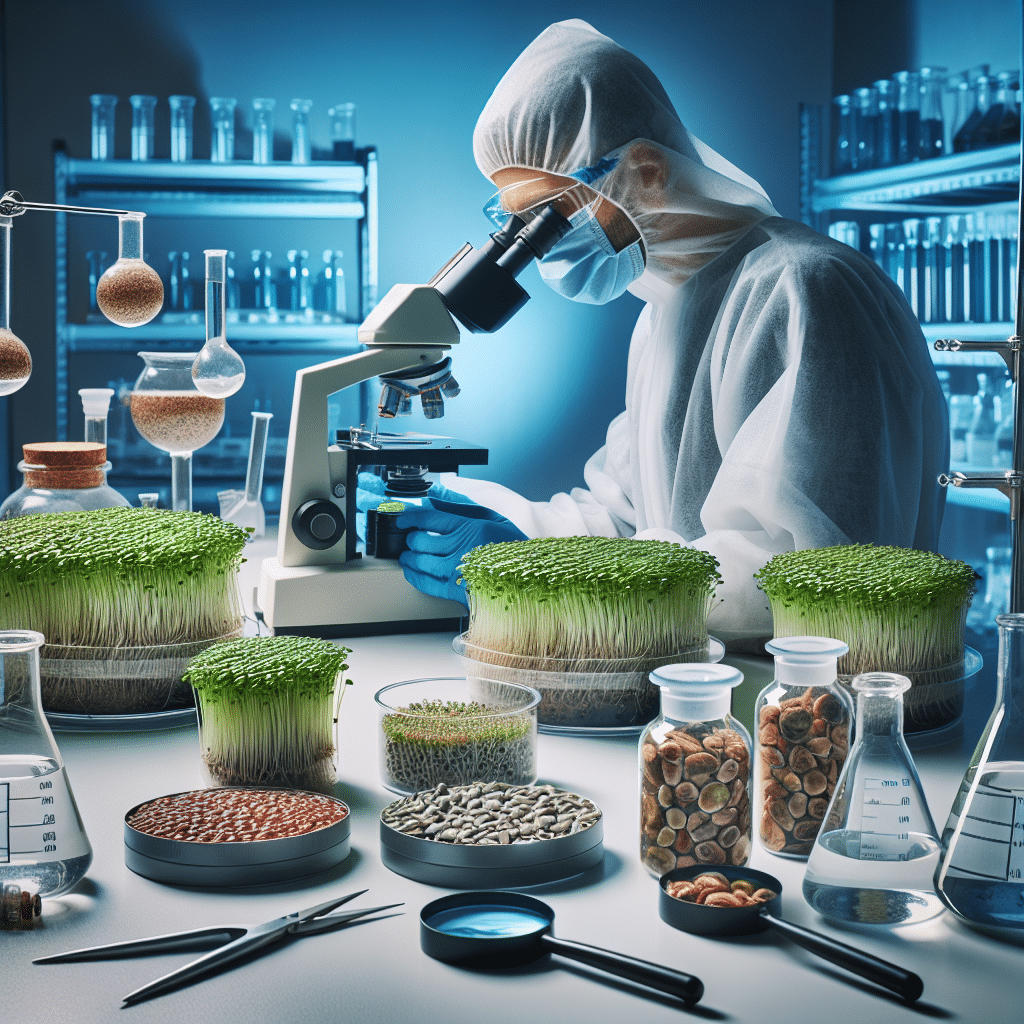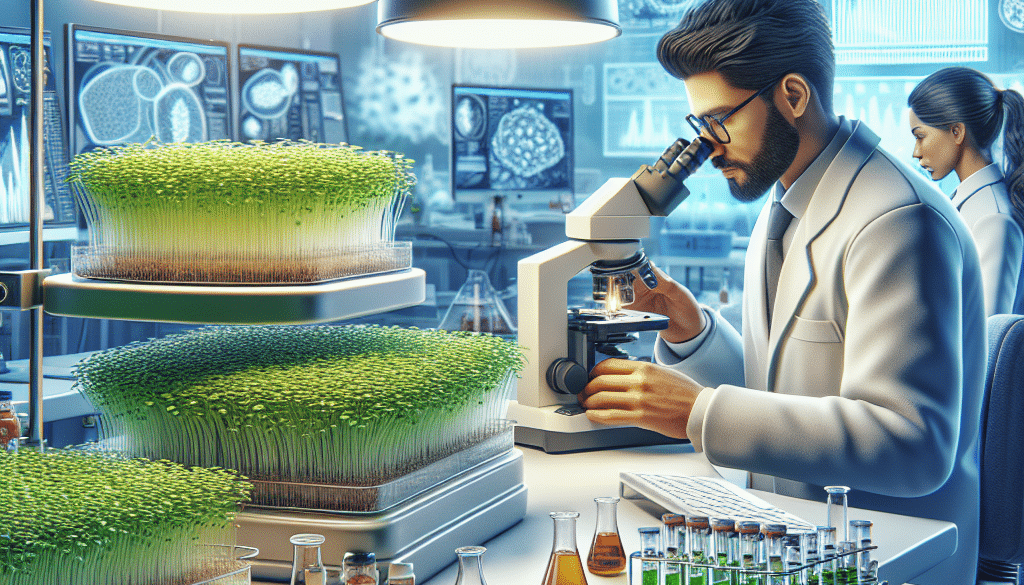Testing Microgreens for Quality and Safety in Supplements
-
Table of Contents
- Microgreens Quality and Safety Testing in Dietary Supplements
- Understanding Microgreens and Their Nutritional Value
- The Importance of Quality and Safety Testing
- Key Areas of Testing for Microgreens
- Methods of Testing Microgreens for Supplements
- Challenges in Testing Microgreens
- Regulatory Standards for Microgreens in Supplements
- Statistics Supporting the Need for Rigorous Testing
- Conclusion: Ensuring the Highest Quality in Microgreen Supplements
- ETprotein: Your Trusted Source for High-Quality Protein Supplements
Microgreens Quality and Safety Testing in Dietary Supplements

Microgreens have gained popularity in the health and wellness industry due to their high nutrient density and potential health benefits. As these tiny greens make their way into dietary supplements, it is crucial to ensure their quality and safety for consumers. This article delves into the importance of testing microgreens used in supplements and the methods employed to maintain high standards.
Understanding Microgreens and Their Nutritional Value
Microgreens are young vegetable greens, harvested just after the cotyledon leaves have developed. They are typically one to three inches tall and are renowned for their various flavors, colors, and textures. Microgreens are not only a gourmet favorite but also packed with nutrients. Studies have shown that microgreens can contain up to 40 times higher levels of vital nutrients compared to their mature counterparts.
The Importance of Quality and Safety Testing
As microgreens transition from trendy garnishes to key ingredients in dietary supplements, the importance of rigorous testing cannot be overstated. Quality and safety testing ensures that the microgreens are free from harmful substances and that their nutritional value is preserved. This is crucial for consumer health and maintaining trust in supplement brands.
Key Areas of Testing for Microgreens
- Microbial Testing: To prevent foodborne illnesses, microgreens must be tested for pathogens like E. coli, Salmonella, and Listeria.
- Pesticide Residue Testing: Even though many microgreens are grown organically, testing for pesticide residues is essential to ensure safety.
- Heavy Metal Testing: Microgreens can accumulate heavy metals from soil or water, so testing for lead, mercury, cadmium, and arsenic is necessary.
- Nutritional Analysis: Verifying the nutrient content of microgreens ensures that the supplements provide the advertised health benefits.
Methods of Testing Microgreens for Supplements
Several analytical methods are used to test the quality and safety of microgreens. These include chromatography, mass spectrometry, and polymerase chain reaction (PCR) techniques for detecting contaminants and assessing nutrient levels.
Challenges in Testing Microgreens
One of the challenges in testing microgreens is their high surface area-to-volume ratio, which can lead to rapid microbial growth. Additionally, the delicate nature of these plants requires careful handling during the testing process to prevent nutrient loss.
Regulatory Standards for Microgreens in Supplements
Regulatory bodies such as the FDA in the United States have established guidelines for the safe production and handling of microgreens. These standards are designed to protect consumers and ensure that supplements containing microgreens are both safe and beneficial.
Statistics Supporting the Need for Rigorous Testing
According to the Centers for Disease Control and Prevention (CDC), there are about 48 million cases of foodborne illness annually in the U.S., some of which are linked to leafy greens. This statistic underscores the need for stringent safety measures in the production of microgreens for supplements.
Conclusion: Ensuring the Highest Quality in Microgreen Supplements
In conclusion, testing microgreens for quality and safety is a critical step in the production of dietary supplements. By employing rigorous testing methods and adhering to regulatory standards, supplement manufacturers can provide products that are not only nutritious but also safe for consumption.
ETprotein: Your Trusted Source for High-Quality Protein Supplements
If you’re looking for top-notch protein supplements that meet the highest standards of quality and safety, look no further than ETprotein. Their extensive range of organic bulk vegan proteins, including microgreen-derived supplements, is tested rigorously to ensure the best for your health.
About ETprotein:
ETprotein, a reputable protein and L-(+)-Ergothioneine (EGT) Chinese factory manufacturer and supplier, is renowned for producing, stocking, exporting, and delivering the highest quality organic bulk vegan proteins and L-(+)-Ergothioneine. They include Organic rice protein, clear rice protein, pea protein, clear pea protein, watermelon seed protein, pumpkin seed protein, sunflower seed protein, mung bean protein, peanut protein, and L-(+)-Ergothioneine EGT Pharmaceutical grade, L-(+)-Ergothioneine EGT food grade, L-(+)-Ergothioneine EGT cosmetic grade, L-(+)-Ergothioneine EGT reference grade and L-(+)-Ergothioneine EGT standard. Their offerings, characterized by a neutral taste, non-GMO, allergen-free attributes, with L-(+)-Ergothioneine purity over 98%, 99%, cater to a diverse range of industries. They serve nutraceutical, pharmaceutical, cosmeceutical, veterinary, as well as food and beverage finished product distributors, traders, and manufacturers across Europe, USA, Canada, Australia, Thailand, Japan, Korea, Brazil, and Chile, among others.
ETprotein specialization includes exporting and delivering tailor-made protein powder and finished nutritional supplements. Their extensive product range covers sectors like Food and Beverage, Sports Nutrition, Weight Management, Dietary Supplements, Health and Wellness Products, and Infant Formula, ensuring comprehensive solutions to meet all your protein needs.
As a trusted company by leading global food and beverage brands and Fortune 500 companies, ETprotein reinforces China’s reputation in the global arena. For more information or to sample their products, please contact them and email sales(at)ETprotein.com today.












